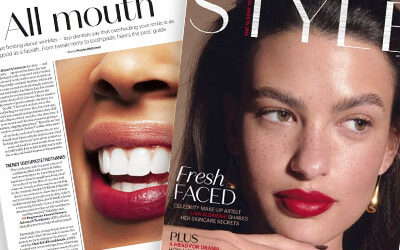Telegraph Feature-“Teeth reveal more than you realise.”
‘I have the dreaded dental pockets and spend hours trying to beat them’
Bleeding gums could be a sign of gum disease, which can cause further problems
20 March 2023 • 8:24am
Your teeth reveal more about your health than you realise
When I open my handbag, a veritable rainbow of interdental brushes (red, green, purple, yellow) falls out. As I scramble to retrieve them, my boyfriend groans. It’s fair to say my teeth are the third person in our relationship. I spend seemingly hours in the bathroom, brushing and flossing, giving Mike time to read at least two broadsheet newspapers. I’d rather leave my makeup on overnight than miss out on flossing.
Because I have the dreaded middle-aged condition known as periodontal pockets, a symptom of periodontitis (gum disease), which if left untreated can lead to severe infection, loss of hard and soft tissue (bone and gum), and eventually lead to tooth loss.
It’s not sexy. But I’m not alone. Friends come back white-faced from the dentist. “Apparently I’ve got this thing called pockets,” they whisper. “The hygienist says I’ve several pockets that are over 6mm [anything over 4mm is worrying].”
Welcome to my world. Now aged 60, I’ve spent the past 10 years trying to defeat the pockets, staying vigilant if I get a sore area of gum, flossing madly with a dental toothpick if a fragment of peanut gets caught in my incisor. Sometimes I’ll discreetly step behind a tree to do it, much to Mike’s horror.
If I go away for the weekend, my dental kit weighs a ton – electric toothbrush, charger, timer, mouthwash. Three different types of toothbrush head. Fluoride toothpaste. Plus all those fiddly little sticks.
So what are periodontal pockets? And why do we get them? Normally healthy teeth are held snugly in their sockets by gum tissue and bone, but when you have gum disease, tissue breakdown can occur, causing gaps. These pockets hold bacteria, causing damage to the surrounding tissues, including bone, that anchor teeth within the jaw. If gums bleed, a periodontal pocket may have formed.
“Bleeding gums are the body’s way of saying ‘There’s inflammation, I’m not happy’,” says cosmetic dentist Dr Uchenna Okoye (star of Channel 4’s 10 Years Younger and founder of the clinic London Smiling).
A dentist will measure the size of the space between your gums and teeth with a periodontal probe to determine the depth and size of the pocket and what treatment is needed.
Pockets are measured in millimetres. Anything over 4mm means gum disease is present; 5-7mm is moderate periodontitis; 7-12mm, advanced periodontitis. “Like everything in dentistry, the higher the number, the worse you’re doing. By the time you get to 8mm or 9mm your teeth can be really mobile, you might even have lost several,” says Dr Okoye.
She compares the roots of teeth to a picket fence. “For years the fence looks fine, but as the ground around it is undermined, it becomes looser, and eventually collapses.”
Growing up my generation had shabby dental treatment. It seems shocking now but dentistry was pretty unregulated in the 1960s and 1970s. Some dentists did unnecessary fillings and tooth extractions because they were paid by the tooth.
The health of your gums could save your life.
There was no fluoride in drinking water, no electric toothbrushes. Today modern young hygienists are shocked by the state of our mouths. One handsome 53-year-old male friend with pockets was told bluntly: “You have the gums of an 80-year-old dementia patient.” But actually I feel indignant on our behalf. We weren’t looked after very well.
Like most of my peer group I have spent a small fortune rescuing my teeth. So I assumed I was finally heading in the right direction. But then when I was 50, Dr Okoye’s hygienist spotted that I had the dreaded pockets. And a whole new world of shame opened up!
Periodontal disease can be hereditary – my mum has it; my grandmother was given dentures as a birthday present in her 20s. But gum issues get worse in midlife, Dr Okoye explains. “A lot of it happens from your 40s to mid-60s. It creeps up when you’re just so busy, you don’t think about it.”
It tends to happen during periods of high hormone activity like puberty, pregnancy and menopause. But also stress is a big driver. Smoking, drinking, lack of sleep, poor diet, a deterioration in oral hygiene, they all impact gums.
Talking about pockets is not fashionable, Dr Okoye acknowledges. “If this was a story about veneers or going on holiday to get Turkey teeth, there would be far more attention.” So it’s important to break the taboo – and let people know they can seek help.
Because it’s not just vanity. The health of your gums could save your life. Periodontitis doesn’t just cause gums to be inflamed and bleed – it can spark a harmful chronic inflammatory response throughout the body, putting you at serious risk of developing severe or fatal Covid-19 as well as other illnesses such as dementia, diabetes and cardiovascular diseases.
“If I see guys with big pockets,” says Dr Okoye, “I immediately send them to see their GP because they may have heart problems or very high blood pressure.”
A study released in February by Rockefeller University in New York found that oral bacteria can enter the blood and trigger hallmarks of immune activity involved in rheumatoid arthritis, bolstering the idea that gum disease may contribute to the painful joint condition. Likewise some health issues can make you more vulnerable to gum problems.
“If there’s a systemic condition like diabetes which suppresses your immune system in your family, then you and your hygienist need to become best friends, because it means you’ve got a predisposition to gum disease. If you come regularly, we can spot anything early,” says Dr Okoye.
She looks serious for a moment. “I always say to people that periodontal disease, having these deep pockets, is the dental equivalent of cancer. It’s a horrible analogy, but you’re never cured, you go into remission.”
“Around 50 per cent of the population has some level of gum disease,” agrees periodontist Dr Sonia Joshi, “and around 11 per cent have very severe gum disease. It’s one of the most common non-communicable diseases out there. It’s a major public health issue because of the impact it also has on systemic health.”
Fortunately, small pockets of 4mm or 5 mm may be reduced in size with professional dental cleaning where they remove plaque and tartar from around teeth, reducing gum inflammation. I have it done every two months now. It costs £180, but I really want to be able to eat (and kiss) in the future.
“If you have a pocket that’s over 5mm, even if you lived in the bathroom, you can’t get down to the base where all the bacteria is, so you need professional help. With the best will in the world, your toothbrush and all those little interdental brushes can only go down to maybe 3mm,” says Dr Okoye.
If the pockets are really deep, scaling and root planing can help to remove bacteria, plaque and tartar from around teeth. It also smooths each tooth’s root surface so that gum tissue can heal around the root. This also helps to shrink the pocket.
If you have a deep pocket or bone loss but the tooth may still be saved, your dentist may recommend pocket reduction surgery. It’s usually done by a specialist, such as a periodontist. Small incisions are made in the gums to allow a portion of gum tissue to be flapped back. This exposes the tooth’s roots so that deeper scaling and root planing can take place.
It can cost around £6,000-£7,000 to manage advanced gum disease (including implants). The irony is we can sort it out ourselves for free, if we brush properly. “Really it’s about elbow grease,” Dr Okoye laughs. “Physically removing the bacteria from the tooth and below the gum-line. Because every day the plaque is regrowing. Make sure you clean every surface – people often forget the in-between surfaces. The most important thing is what you’re doing at home.” If our gums bleed that’s not a message to leave sore areas alone, she adds, we need to intensify cleaning of those areas.
So I’m doomed to spend half my life in front of the bathroom mirror. But I’m proof there can be progress. “Your 9.3mm pocket has shrunk to 5.22mm,” says Dr Okoye, showing me a periodontal chart of my teeth, with neat pastel colours showing areas of plaque, gum recession and pocketing.
Every mouth contains bacteria. No one should feel ashamed. But establishing good oral hygiene practices early on goes a long way to preventing harmful bacteria building up.
So carry those colourful interdental brushes with pride.
Read the full article online
Our Blog
Previous Articles
Understanding and Alleviating Teeth Sensitivity: A Comprehensive Guide
Do you cringe when enjoying your favorite ice cream or sipping a hot cup of coffee due to sudden tooth sensitivity? If so, you're not alone! Teeth...
All mouth – overhauling your smile is as good as a facelift.
Sunday Times Style23rd April 2023- features expert quotes from Dr. Uchenna Okoye on how ageing affects our teeth Forget fretting about wrinkles -...
DIY Beauty treatments (that really work)
Sainsbury’s MagazineMay 2023 - features expert quotes from Dr Uchenna Okoye on DIY teeth whitening As the days get longer and brighter, we start to...






